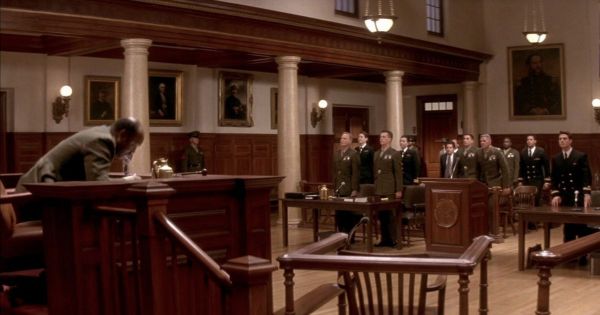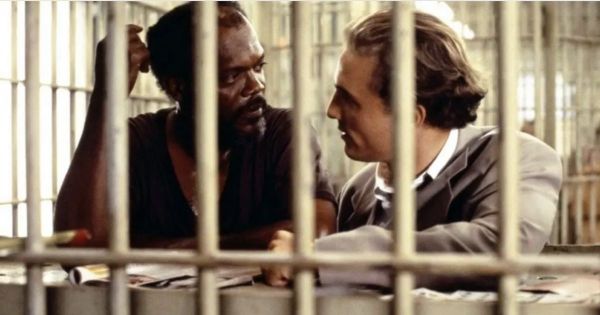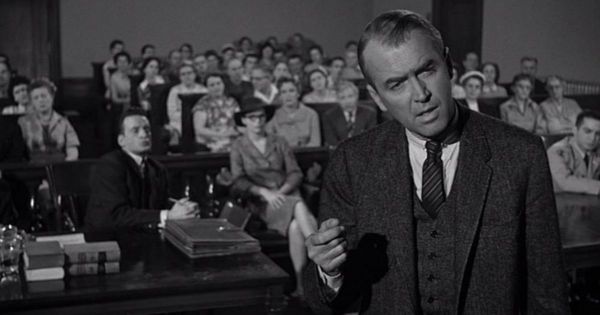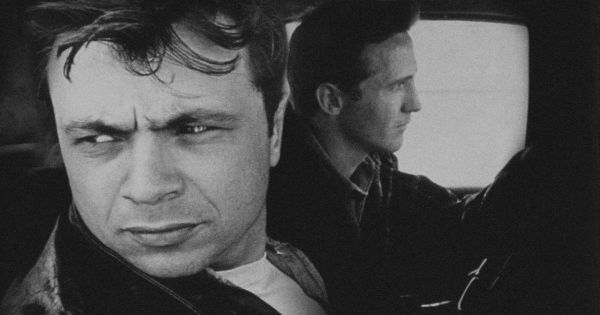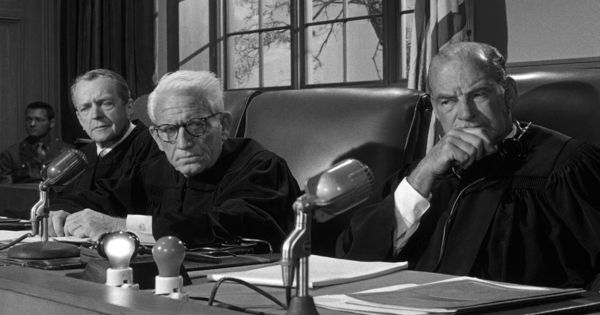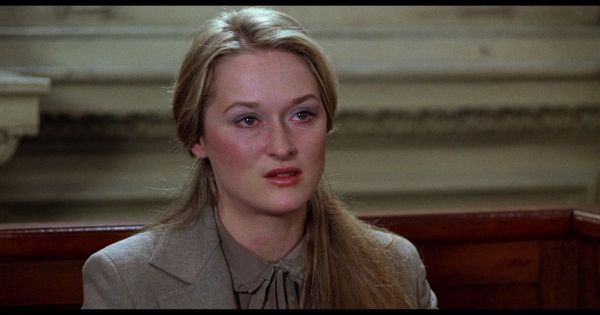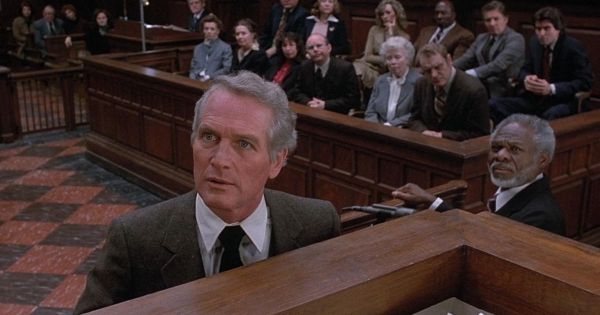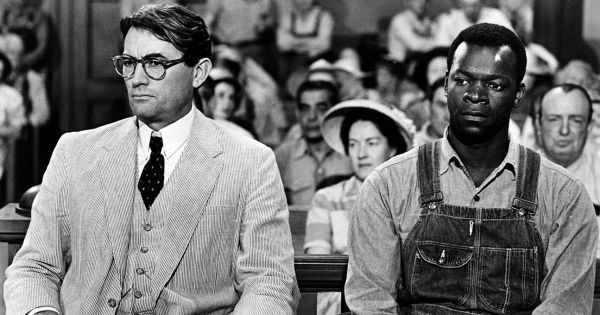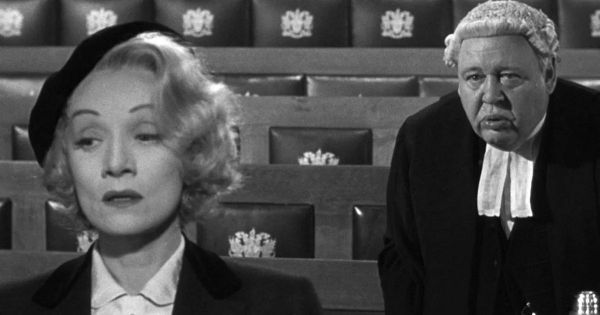Hollywood has continuously produced courtroom dramas that have wowed audiences with their compelling themes and narrative for many years. The well-liked genre has had a significant impact on the entertainment industry and is still a tried-and-true way of filmmaking, from thrilling literary adaptations to legendary cinematic characters.
In the same way that critics and moviegoers were completely enthralled by the challenging task a dozen jurors faced in the beloved classic 12 Angry Men, few can forget the career-defining performance silver screen legend Gregory Peck gave as the resilient lawyer Atticus Finch in the lauded hit To Kill a Mockingbird. In the renowned 1970s movie Kramer vs. Kramer, Meryl Streep earned her first Oscar for her performance as a mother battling her ex-husband for custody of their child. These are the all-time greatest courtroom dramas.
12 Angry Men
The gripping 1957 courtroom drama 12 Angry Men, widely regarded as one of the best movies ever made, follows the struggles and attempts of a New York City jury as they attempt to determine whether a poor 18-year-old should be found guilty in the death of his violent father. As Davis, the sole juror who first voted “not guilty” and questioned the veracity of the evidence used during the trial, Henry Fonda is outstanding.
Davis’ refusal to jump to conclusions forces the other men to consider the evidence and their own biases more carefully. With a 100% rating on Rotten Tomatoes, 12 Angry Men has been hailed as a cinematic masterpiece and is admired for its influence on the legal genre and storytelling in general.
A Few Good Men
A Few Good Men, Rob Reiner’s 1992 courtroom victory and Oscar nominee in which Tom Cruise plays a military defense attorney hired to represent two U.S. Marines accused of murder on the grounds that they were following orders. The acclaimed screenwriter Aaron Sorkin based his engrossing story on his sister’s journey to Guantánamo Bay to look into and defend Marines involved in a risky hazing incident.
A Few Good Men, which also starred Jack Nicholson, Demi Moore, and Kevin Bacon, received high praise for its directing, acting, and significant issues. Nicholson’s passionate exclamation, “You can’t handle the truth!” after arguing with Cruise’s character has become a movie classic.
A Time to Kill
The 1996 legal drama A Time to Kill, which was adapted from the John Grisham book of the same name, stars a stellar cast of Hollywood greats, including Matthew McConaughey, Sandra Bullock, and a great Samuel L. Jackson. The film portrays the heartbreaking story of a distraught Black father who decides to exact revenge on the two white criminals who brutally attacked his baby daughter.
Carl Lee Hailey (Jackson) turns to a brave young lawyer (McConaughey) to defend him in a trial when the shocking retaliation attracts the attention of the national media. The two go up against the prejudiced Mississippi town and the menacing Ku Klux Klan. Jackson was nominated for an NAACP Image Award and received a Golden Globe for his compelling portrayal of the grieving father.
Anatomy of a Murder
the excellent The 1959 gripping crime thriller Anatomy of a Murder, starring James Stewart as a small-town lawyer on a mission to rescue his client and learn the truth, centers on the murder of an innkeeper by a US Army Lieutenant who claims he did the act after the man sexually attacked his wife.
The intriguing movie, which features a magnificent Duke Ellington score, was inspired by both a 1952 case in which a Lieutenant accused of murder invoked the insanity defense of an overwhelming desire and the Robert Traver novel. Anatomy of a Murder received praise for its tense storytelling, multi-layered acting, and legal and educational professionals alike. Empire Magazine even proclaimed it to be “the best trial movie ever filmed.”
In Cold Blood
With the groundbreaking 1967 crime drama In Cold Blood, Truman Capote’s ground-breaking true crime bestseller was given the movie treatment. Audiences were astounded by its shocking real-life recreation of the tragic 1959 murders of the Clutters, in which four members of the renowned Kansas family were killed by ex-convicts Richard Hickock and Perry Smith.
During the film’s production, Capote and director Richard Brooks collaborated closely. In order to give the drama a documentary aspect, the director decided to cast Robert Blake and Scott Wilson as the homicidal villains. In Cold Blood was one of the top 10 courtroom dramas of all time according to the American Film Institute and received four Academy Award nominations, including Best Director.
Judgment at Nuremberg
In the 1961 famous film Judgment at Nuremberg, based on the Abby Mann television drama of the same name, legendary movie star Spencer Tracy plays a respected Chief Justice tasked with supervising the trial of four Nazi judges in 1948-occupied Germany. Dan Haywood, a retired American judge who is appointed to oversee the proceedings and take in the information given regarding the crimes against humanity committed by the Nazi Reich, is compellingly portrayed by Tracy.
The actor went on to deliver a scene-stealing 13-minute statement at the conclusion of the play, accomplishing it in one take and drawing incredible acclaim from fellow actors and crew members. Film writer Mann created the role especially for the actor. Mann wrote to Tracy after viewing Judgment at Nuremberg in its final form and stated: “Every writer should have the opportunity to watch Spencer Tracy deliver their sentences. Nothing else in the world compares to it.”
Kramer vs. Kramer
Meryl Streep gave a standout performance alongside Dustin Hoffman in the critically acclaimed 1979 fight film Kramer vs. Kramer, showcasing her great acting talent. The movie depicts the separation of workaholic businessman Ted Kramer and his wife Joanna, as well as the lasting effects it has on their young boy and their respective views on co-parenting.
The Robert Benton film details the tumultuous custody dispute between the Kramers and the character assassinations Ted and Joanna endure as a result of the struggle. Hoffman was accused of pestering Streep because of his method acting style, which made the film’s production very contentious. Despite the animosity between the two actors on set, both actors won Oscars for their powerful performances.
The Verdict
In the 1982 drama The Verdict, where he plays ambulance-chasing lawyer Frank Galvin who decides to take on a significant medical malpractice case in the hopes of regaining his own self-respect and finally making a difference in his field, revered leading man Paul Newman is a force to be reckoned with.
Due of the character’s overwhelming strength, the project was much sought after in Hollywood. Before Newman was finally hired, other actors including Cary Grant, Frank Sinatra, and Dustin Hoffman all expressed interest in the part. It was adapted from the Barry Reed novel of the same name. The Verdict was a critical and financial success, garnering five Oscar nominations and placing among the “101 Greatest Screenplays Ever Written” according to the Writers Guild of America.
To Kill a Mockingbird
When he played the kind and determined Atticus Finch in the 1962 classic To Kill a Mockingbird, which described the lawyer’s attempts to defend a Black man from false rape accusations in the rural Alabama town of Maycomb in the 1930s, the great Gregory Peck justly earned the Academy Award for Best Actor.
The extraordinary film, which was based from Harper Lee’s Pulitzer Prize–winning book, struck a chord with critics and viewers alike, grossing six times its budget and taking home three Academy Award nominations. Without a doubt, one of the finest performances of all time belongs to Peck as the eponymous literary character Finch. He would subsequently declare To Kill a Mockingbird to be “my favorite movie, without a doubt.”
Witness for the Prosecution
The suspenseful 1957 courtroom thriller Witness for the Prosecution, which was adapted from the Agatha Christie classic, stars Marlene Dietrich as the cold and cynical wife of a man charged with murder. The movie follows Leonard Vole as he is charged with the murder of a well-known socialite and must rely on Christine, his vicious wife, to provide his alibi. When Christine discovers a weakness, she decides to testify against her husband instead, setting in a startling confrontation between the married pair.
Director Billy Wilder even kept the actors in the dark about how Witness for the Prosecution would conclude, waiting until the shooting day to make the revelation. The thrilling drama’s surprise ending was kept a secret upon its release, with a voiceover during the credits pleading with moviegoers to keep it a secret for those who have yet to see it.



